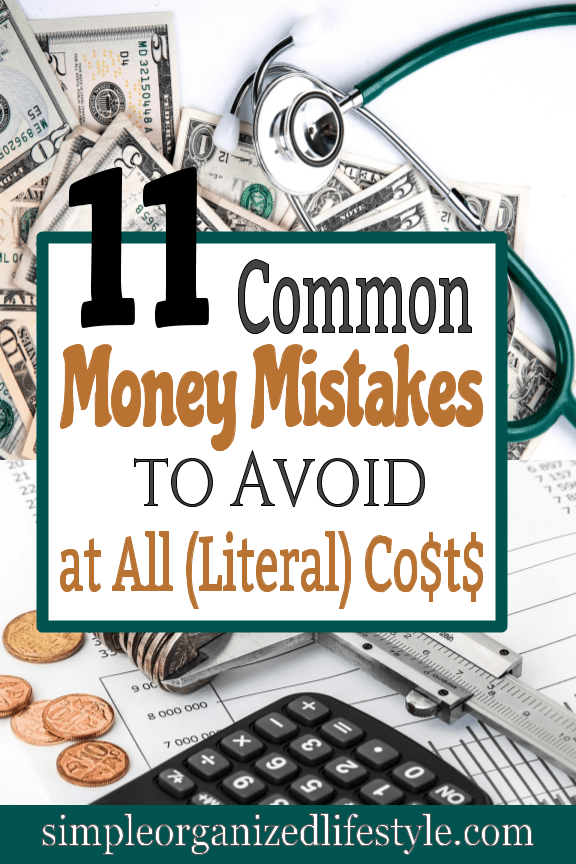Are you trying to get your finances in order and coming up empty handed? Looking for a place to start? Fixing these common money mistakes to avoid at all (literal) costs can change your finances and your future!
I can speak to all of these common money mistakes to avoid because I made all of them! That was before I started on the path to understanding personal finance in my early 30’s. I spent my mid-30’s cleaning up the financial mess that I was fully responsible for creating.
No matter what age you are or what your finances look like, the key is to make changes now. Unlike other changes that often take a long time to see the results, money mistakes can be fixed to experience an immediate positive impact.
1- Not having enough savings
Most people put off savings because they live paycheck to paycheck or they put it off as something to do “later.” This is a recipe for financial disaster.
Savings are critical to handle emergencies that are not in the monthly budget. These emergencies will come whether you are financially prepared or not. It is such a peace of mind to have enough money saved to cover unexpected expenses.
Retirement is another area where people do not save, or do not save enough. This type of savings needs time to grow. Retirement savings need to be increased over time as your salary increases in order to plan for inflation and cost of living. “Someday” will come sooner than most people think!
2- Using credit cards
Speaking from the school of hard knocks experience, credit cards will send your finances spiraling out of control…fast.
At one point in my life, I used credit cards like they were my personal loan assistants. That was convenient until I also got charged with the high fees and interest that came with the balances. It took me years to become free from credit card debt.
We still have a credit card. We use it mostly for online purchases because it offers some great protection services. However, we have it set up where the bill is paid in full each month automatically from a separate checkings account.
Credit cards are convenient but oh so costly. We want something immediately, like a new piece of furniture or a vacation or a new laptop, so the credit card becomes a way to get what we want quickly. Then the new wears off and we’re left with a pile of debt.
The credit card bill comes in month after month and it just plain sucks to get caught in that cycle with a new purchase that ends up costing double the price after interest and fees.
If you do continue to use a credit card, be sure you know the terms and pay it off each month. If that’s not possible, then avoid credit cards at all (literal) costs!
3- Buying a new car
After I had been working a few years, I decided I “deserved” a new car. I was working hard and everyone else had new cars so why not? So, I signed the dotted line for a car that wasn’t a good financial decision at the time.
Don’t get me wrong. I loved that car. But not long after I bought it, I wanted the monthly payment in the bank account more than I wanted the car. In selling the car, I was buying another step closer to financial freedom.
A new car feeling is just not as fulfilling as making that monthly payment to yourself. Besides, a monthly car payment is just one piece of the car budget. There is gas, insurance and maintenance that comes along with it.
There are some very fair prices on reliable, used cars. When you can save up enough money to pay cash for a used car, it is an incredible feeling! You avoid paying interest on something that depreciates as soon as you turn into your driveway. Another bonus is that dings and scrapes are just not that big of a deal!
4- Overspending
Overspending is not your financial friend. Mr. (or Mrs.) Overspend is a friend of the Jones’. They are busy buying and keeping up with the latest and greatest gadgets. This kind of spending is (to quote Dave Ramsey) “to buy things we don’t need, with money we don’t have, to impress people we don’t like.”
Spending less than you earn is a wealth building habit and spending more than you earn is a debt building habit. Overspending is the enemy of a healthy bank account. It will quickly derail your efforts to get ahead financially.
To avoid overspending, resist the games retailers play to get you to spend more than you intended to spend. Shop on a clear mission for the things that you must have rather than the things that you want.
A frugal lifestyle is not the image some people have of eating Ramen noodles and clipping coupons. It’s simply making better choices with our money in order to see more of it.
5- Not knowing your numbers
You may know how much is in your checking and savings account, but do you know how much you owe on your mortgage? How about your net worth (assets minus liabilities)? Credit card balances? Monthly utility bills?
Knowing these numbers is critical to your financial health. It makes the difference in being able to set short term and long term financial goals and staying motivated. You need these numbers to plan and know when a problem occurs before it’s too late.
6- Not having updated legal documents
When I first started my salaried job, there was so much paperwork tossed at me that I was pretty much just signing dotted lines without even knowing what I was signing. I was single at the time and designated my mom as beneficiary for different accounts. When I had a child, I went back and changed the paperwork, as my mom has done for me.
Updating legal documents is a total pain and, in the case of a will, it comes with a cost. However, if you signed papers when you were married and your (now) ex-husband or ex-wife was designated as the beneficiary, that’s who is going to get your savings.
Should something happen to you, that one little signature on one form means your money could end up in the wrong hands.
Keep your legal documents up to date not for you, but for those closest to you.
7- Buying too much house
We live in a just under 2000 sq feet brick home, 3 bedrooms, 2 1/2 baths, and an unfinished basement. We followed all of the guidelines at the time for building a home within our financial means even though we were approved for much more. And my point is… we still bought too much house.
You know what happens with a bigger house? You fill it with more fancy things that becomes something else to dust. A bigger home becomes a burden and a money pit!
I value and believe in home ownership, but you and I are really just borrowers and renters until the home is paid for. And if we buy too much house, that costs much more than the mortgage. It will take more time, more upkeep, and more money to maintain.
8- Having the wrong insurance plans
Having the wrong insurance plans can be interpreted in two different ways. On one hand, you could have too much insurance because someone sold you a plan as an investment that turned out to be just a complicated expense. On the other hand, you may not have enough insurance to protect yourself and those closest to you.
You need to decide which insurance is essential and what could be a potential scam. The only way to do so is to carefully read through the fine print and coverage. If not, you could end up paying for something that’s already covered through your basic home, auto, health and life insurance policies.
9- Avoiding conversation about money
Money is a taboo subject in many homes and families, or it is a subject that ends in a heated argument. I believe it’s a big mistake to avoid conversation about money and one of the reasons couples fight about money. Setting aside time to talk about where you’re at with your current finances and where you want them to be is healthy for families and marriages.
It’s also better than okay to talk about money with your kids. I grew up hearing “money doesn’t grow on trees” “we can’t afford that” and “that’s only for the rich.” I tagged along with family members to the bank for car loans and personal loans so it just seemed like the thing to do. No one talked about personal finance. That’s something that needs to change for finances to change.
With today’s technology, there are awesome places online where you can find people who want to talk about everything related to finances. This is a great way to engage in conversation about finances and find people who are sharing information about how to avoid common money mistakes.
10- Not having a budget
A budget is your spending plan. It’s your path to financial freedom. It tells you where to go, when to go, when to stop, and how to get there. My favorite online budgeting tool is Rosemarie’s 90 Day Budget Bootcamp. She leads you step by step in creating a budget.
I don’t understand why people view a budget as if it were handcuffs. Debt is handcuffs. A budget is the key to open them!
More articles about budgeting:
- Shopping on a Budget When You’re a Spender
- Zero Based Budgeting
- How to Get Your Husband on Board with a Budget
11- Paying fees
A common money mistake is paying fees. This could be paying a late fee, an overdraft fee, or withdrawal fees.
A few months ago I called to ask my bank why I had been charged a $5.00 fee on a savings account. It turns out the fine print said that if the account went below a certain amount, a $5.00 fee would be charged until it met the minimum account balance. I closed the account and stopped doing business with this bank because of too many fees and less than ideal customer service.
A great way to avoid this money mistake is to automate your savings and payments. It helps avoid late fees and saves your time too.
The good thing about common money mistakes is that there are solutions and ways to avoid them. It’s never too late to start fixing them one by one turn your financial situation around!


